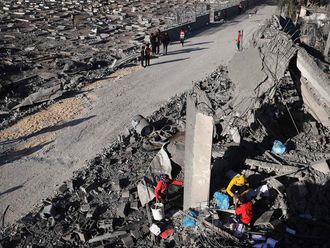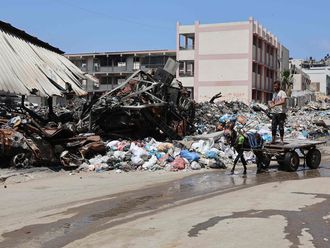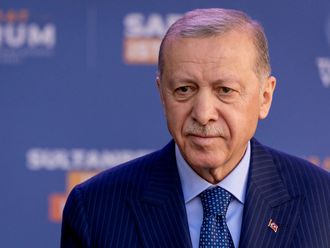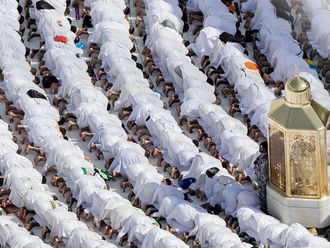Ramallah: The Palestine Liberation Organisation decided at the last minute to delay internal leadership elections, which had been due next week, in a sign of growing disarray, two officials said.
Palestinian President Mahmoud Abbas had called for the vote by the PLO parliament and its postponement was a blow to his leadership. The decision was taken on Monday by the PLO Executive Committee.
Ahmad Majdalani and Saleh Rafaat, who participated in the meeting, said the panel felt the time for preparations was insufficient. They said the committee didn’t set a new date, but had decided that the PLO parliament, or Palestinian National Council, should meet before the end of the year.
The parliament was to have chosen new PLO leaders and considered a more confrontational policy toward Israel, after years of impasse in negotiations on Palestinian statehood.
“There has been a proposal signed by several Palestinian factions and independents from within the Palestinian territories and from diaspora demanding a delay to the meeting,” Hanna Amirah, a member of the PLO Executive Committee, told the Palestinian Radio. The Palestinian National Council is scheduled to convene in Ramallah on September 14 and 15, but several Palestinian factions announced they would boycott the session.
Amirah said “the PLO meeting will address the consequences of the absence of several Palestinian factions to the meeting.”
Referring to the agenda of the Palestinian National Council, Ahmad Majdalani, a member of the PLO Executive Committee, said the meeting had been planned to announce dramatic decisions once Palestinian President Mahmoud Abbas and several other PLO members had resigned: declaring Palestine a state under occupation and reneging on obligations mentioned in the Oslo Accords. “After voting on the decisions, the Palestinians are expected to announce the annulment of all agreements signed between the PLO and Israel and to declare a new relationship with the Jewish state,” he told Maan News Agency.
“The announcement has already been drafted by the preparatory committee of the Palestinian National Council.”
The Oslo Accords, as well as the agreement signed in Sharm Al Shaikh of Egypt in 1994, are expected to be cancelled. Also set to be annulled are an economic agreement signed in Paris (Paris Economic Protocol) and several pacts on the security cooperation between the Palestinian National Authority (PNA) and Israel.
The Palestinian decisions will be accompanied by an announcement by President Abbas at the UN General Assembly session at the end of September that Palestine will be considered a state under occupation.
The Popular Front for the Liberation of Palestine (PFLP) has warned that holding a session of the Palestinian National Council will have far-reaching implications for the Palestinian cause in itself. “Insistence on holding the meeting will deepen the Palestinian internal political crisis and perpetuate the Palestinian division,” said Hussain Mansour, a member of the PFLP Central Committee. “This is grave political mistake that must be avoided in the first place.”
He urged the Palestinian leadership to slow down instead of reaching conclusions that would have catastrophic consequences for the Palestinian cause. “The PFLP calls on the very limited number of Palestinian political parties and factions which declared intentions to attend the meeting to boycott it with immediate effect,” he said.
Dr Gassan Al Khatib, a political analyst and former spokesperson for the Palestinian government said that any deviation from the plan to hold the meeting of the Palestinian National Council could have grave consequences for the Palestinian public. “The Palestinian factions have problems choosing their representatives at the council and that should not prevent the meeting of the Palestinian most senior authority [Palestinian National Council],” he told Gulf News. “Reform becomes possible only after the Palestinian factions meet and address issues, not before,” he said. “The Palestinian public stands in urgent need to renew and reform its leadership and the meeting of the council will do that job.”
— With inputs from agencies












